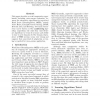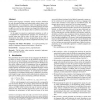997 search results - page 16 / 200 » Completely Lazy Learning |
140
Voted
ECCV
2010
Springer
15 years 7 months ago
2010
Springer
Sparse coding of sensory data has recently attracted notable attention in research of learning useful features from the unlabeled data. Empirical studies show that mapping the data...
114
Voted
IJCNN
2007
IEEE
15 years 9 months ago
2007
IEEE
— Many neural network models of (human) motor learning focus on the acquisition of direct goal-to-action mappings, which results in rather inflexible motor control programs. We ...
105
Voted
ICML
2000
IEEE
16 years 3 months ago
2000
IEEE
Most machine learning algorithms are lazy: they extract from the training set the minimum information needed to predict its labels. Unfortunately, this often leads to models that ...
118
Voted
CORR
2000
Springer
15 years 2 months ago
2000
Springer
This paper describes a set of comparative experiments, including cross{corpus evaluation, between ve alternative algorithms for supervised Word Sense Disambiguation (WSD), namely ...
106
Voted
ML
2008
ACM
15 years 2 months ago
2008
ACM
Call-by-value languages commonly restrict recursive definitions by only allowing functions and syntactically explicit values in the right-hand sides. As a consequence, some very a...


